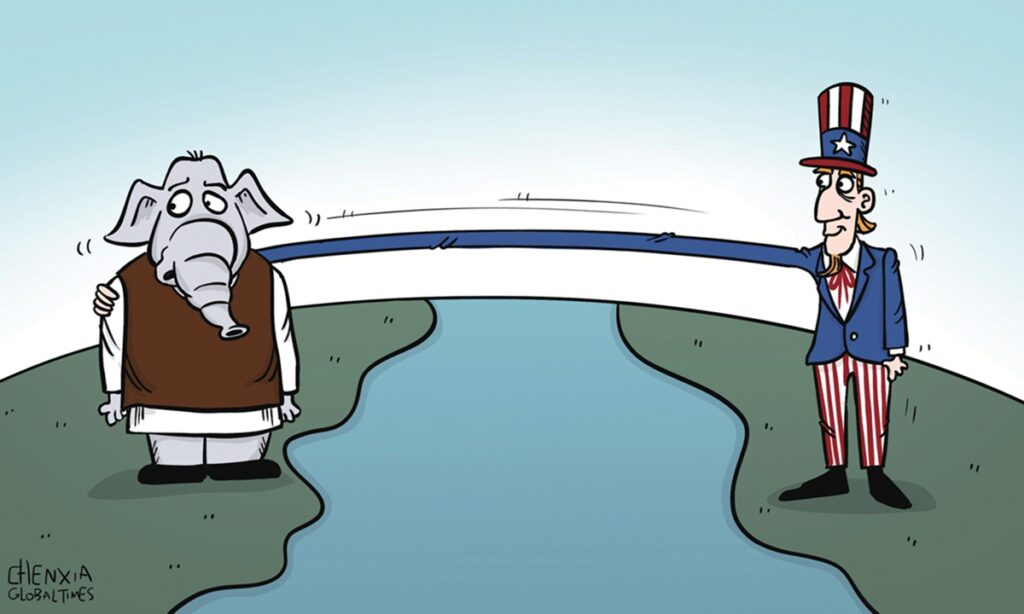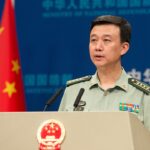India on Monday celebrated 75 years of independence, with Prime Minister Narendra Modi speaking about the developments and challenges the country has faced in his ninth consecutive Independence Day speech, and even though US President Joe Biden keenly called India an “indispensable partner” in a congratulatory message and stressed “democracy,” analysts noted that India will not easily alter its current policy on “diplomatic independence,” as it has brought flexibility and benefits to the country.
August 15 marked the 75th anniversary of the end of British colonial rule over India in 1947. Modi led the celebrations from Red Fort in New Delhi and addressed the nation by saying that it was a historic day for India as it takes a new path with a new resolve. The Indian leader also credited India as being the mother of democracy and talked about various developments in the country as well as challenges during the past 75 years, Indian media reported.
Indians have been celebrating the anniversary for days, with many expressing hope that the country will become a developed country in the near future. India’s first indigenously built aircraft carrier Vikrant was reportedly commissioned on Monday to celebrate the occasion.
On Sunday, US President Joe Biden congratulated India on its 75 years of independence and said the US and India were “indispensable partners” that would continue to work together to address global challenges in the years ahead, and that the US-India Strategic Partnership is grounded in “shared commitment to the rule of law and the promotion of human freedom and dignity,” Reuters reported.
Biden’s congratulatory message showed that the US has attached more importance to relations with India, given its strategic position in the US’ Indo-Pacific Strategy and US plans to counter China, Qian Feng, director of the research department at the National Strategy Institute at Tsinghua University, told the Global Times.
By stressing the “shared” values on “democracy” between India and the US, Biden wants to draw India over to its side and also to put China, Russia or other US adversaries on the opposite side as “authoritarian states,” Qian said. However, the US that has previously criticized India for its policies toward Muslims and on other human rights issues.
For example, the US State Department releases annual reports on different countries’ human rights situations, in which they always criticize India over issues including “unlawful and arbitrary killing.” In April, US Secretary of State Antony Blinken said that the US “is monitoring” what he described as a rise in human rights abuses in India. In response, Indian External Affairs Minister Dr S Jaishankar gave a strong rebuttal to the US criticism and said New Delhi has concerns about human rights in America.
The US’ rhetoric on shared “values” and “democracy” with India is based on its own geopolitical needs, which India has seen through, said Qian, noting that although the Modi government hopes to have closer relations with the West, it will not abandon its practical diplomatic approach of maintaining strategic independence, as this policy gives India more diplomatic room and flexibility.
The benefits of maintaining a strategic balance have been demonstrated in the way India is dealing with the Ukraine crisis, analysts said, noting that despite facing increasing pressure from the US and the West, India has maintained relations with Russia, ensuring both imports of energy from Russia and greater global influence.
Qian noted that India also wants to keep a balance between China and the US to maximize its own interests in the region, which is why it has actively joined the Shanghai Cooperation Organization and other regional organizations with China and is also in the Quad, a framework made up of the US, Japan, India and Australia, which is seen as an effort to contain China. India’s aim is to highlight its unique presence as a littoral state in the Indian Ocean.
As China is India’s neighbor, better bilateral relations will bring benefits to both countries, analysts said, warning that India should also work with China to go in the same direction and urging it to choose a pragmatic policy toward China on sensitive issues, especially the Taiwan question and US-India cooperation.
At a media briefing on Saturday, Chinese Ambassador to India Sun Weidong said that India and China are seeing a “positive impetus” and called on India to stick to the one-China principle, after Indian External Affairs Ministry spokesperson Arindam Bagchi said on Friday that India’s policies on the principle are “well-known and consistent” – the first comment from the Indian government over US House Speaker Nancy Pelosi’s provocative visit to the island of Taiwan.
(Global Times)




